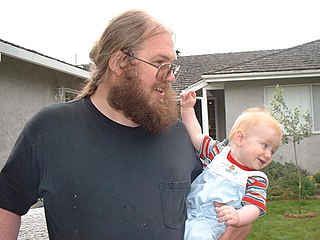Related Research Articles

Machine learning (ML) is an umbrella term for solving problems for which development of algorithms by human programmers would be cost-prohibitive, and instead the problems are solved by helping machines 'discover' their 'own' algorithms, without needing to be explicitly told what to do by any human-developed algorithms. Recently, generative artificial neural networks have been able to surpass results of many previous approaches. Machine learning approaches have been applied to large language models, computer vision, speech recognition, email filtering, agriculture and medicine, where it is too costly to develop algorithms to perform the needed tasks.

The Conference and Workshop on Neural Information Processing Systems is a machine learning and computational neuroscience conference held every December. The conference is currently a double-track meeting that includes invited talks as well as oral and poster presentations of refereed papers, followed by parallel-track workshops that up to 2013 were held at ski resorts.
Bernhard Schölkopf is a German computer scientist known for his work in machine learning, especially on kernel methods and causality. He is a director at the Max Planck Institute for Intelligent Systems in Tübingen, Germany, where he heads the Department of Empirical Inference. He is also an affiliated professor at ETH Zürich, honorary professor at the University of Tübingen and the Technical University Berlin, and chairman of the European Laboratory for Learning and Intelligent Systems (ELLIS).
Michael Irwin Jordan is an American scientist, professor at the University of California, Berkeley and researcher in machine learning, statistics, and artificial intelligence.

In probability theory and machine learning, the multi-armed bandit problem is a problem in which a fixed limited set of resources must be allocated between competing (alternative) choices in a way that maximizes their expected gain, when each choice's properties are only partially known at the time of allocation, and may become better understood as time passes or by allocating resources to the choice. This is a classic reinforcement learning problem that exemplifies the exploration–exploitation tradeoff dilemma. The name comes from imagining a gambler at a row of slot machines, who has to decide which machines to play, how many times to play each machine and in which order to play them, and whether to continue with the current machine or try a different machine. The multi-armed bandit problem also falls into the broad category of stochastic scheduling.

David A. Forsyth is a South-African-born American computer scientist and the Fulton Watson Copp Chair in Computer Science the University of Illinois at Urbana–Champaign.

Michael Lederman Littman is a computer scientist, researcher, educator, and author. His research interests focus on reinforcement learning. He is currently a University Professor of Computer Science at Brown University, where he has taught since 2012.

Jennifer Tour Chayes is dean of the college of computing, data science, and society at the University of California, Berkeley. Before joining Berkeley, she was a technical fellow and managing director of Microsoft Research New England in Cambridge, Massachusetts, which she founded in 2008, and Microsoft Research New York City, which she founded in 2012.

Active learning is a special case of machine learning in which a learning algorithm can interactively query a user to label new data points with the desired outputs. In statistics literature, it is sometimes also called optimal experimental design. The information source is also called teacher or oracle.

Vowpal Wabbit (VW) is an open-source fast online interactive machine learning system library and program developed originally at Yahoo! Research, and currently at Microsoft Research. It was started and is led by John Langford. Vowpal Wabbit's interactive learning support is particularly notable including Contextual Bandits, Active Learning, and forms of guided Reinforcement Learning. Vowpal Wabbit provides an efficient scalable out-of-core implementation with support for a number of machine learning reductions, importance weighting, and a selection of different loss functions and optimization algorithms.
John D. Lafferty is an American scientist, Professor at Yale University and leading researcher in machine learning. He is best known for proposing the Conditional Random Fields with Andrew McCallum and Fernando C.N. Pereira.

Eric Poe Xing is an American computer scientist whose research spans machine learning, computational biology, and statistical methodology. Xing is founding President of the world’s first artificial intelligence university, Mohamed bin Zayed University of Artificial Intelligence (MBZUAI).
Zhou Zhihua is a Chinese computer scientist and Professor of Computer Science at Nanjing University. He is the Standing Deputy Director of the National Key Laboratory for Novel Software Technology, and Founding Director of the LAMDA Group. His research interests include artificial intelligence, machine learning and data mining.
Moshe Tennenholtz is an Israeli computer scientist and professor with the faculty of Industrial Engineering and Management at the Technion – Israel Institute of Technology, where he holds the Sondheimer Technion Academic Chair.

Charles Lee Isbell Jr. is an American computationalist, researcher, and educator. He is Provost and Vice Chancellor for Academic Affairs at the University of Wisconsin–Madison. Before joining the faculty there, he was a professor at the Georgia Institute of Technology College of Computing starting in 2002, and served as John P. Imlay, Jr. Dean of the College from July 2019 to July 2023. His research interests focus on machine learning and artificial intelligence, particularly interactive and human-centered AI. He has published over 100 scientific papers. In addition to his research work, Isbell has been an advocate for increasing access to and diversity in higher education.

Deep reinforcement learning is a subfield of machine learning that combines reinforcement learning (RL) and deep learning. RL considers the problem of a computational agent learning to make decisions by trial and error. Deep RL incorporates deep learning into the solution, allowing agents to make decisions from unstructured input data without manual engineering of the state space. Deep RL algorithms are able to take in very large inputs and decide what actions to perform to optimize an objective. Deep reinforcement learning has been used for a diverse set of applications including but not limited to robotics, video games, natural language processing, computer vision, education, transportation, finance and healthcare.
Maria-Florina (Nina) Balcan is a Romanian-American computer scientist whose research investigates machine learning, algorithmic game theory, theoretical computer science, including active learning, kernel methods, random-sampling mechanisms and envy-free pricing. She is an associate professor of computer science at Carnegie Mellon University.

Hanna Wallach is a computational social scientist and partner research manager at Microsoft Research. Her work makes use of machine learning models to study the dynamics of social processes. Her current research focuses on issues of fairness, accountability, transparency, and ethics as they relate to AI and machine learning.
Elad Hazan is an Israeli-American computer scientist, academic, author and researcher. He is a Professor of Computer Science at Princeton University, and the co-founder and director of Google AI Princeton.

Jennifer (Jenn) Wortman Vaughan is an American computer scientist and Senior Principal Researcher at Microsoft Research focusing mainly on building responsible artificial intelligence (AI) systems as part of Microsoft's Fairness, Accountability, Transparency, and Ethics in AI (FATE) initiative. Jennifer is also a co-chair of Microsoft's Aether group on transparency that works on operationalizing responsible AI across Microsoft through making recommendations on responsible AI issues, technologies, processes, and best practices. Jennifer is also active in the research community, she served as the workshops chair and the program co-chair of the Conference on Neural Information Processing Systems (NeurIPs) in 2019 and 2021, respectively. She currently serves as Steering Committee member of the Association for Computing Machinery Conference on Fairness, Accountability and Transparency. Jennifer is also a senior advisor to Women in Machine Learning (WiML), an initiative co-founded by Jennifer in 2006 aiming to enhance the experience of women in Machine Learning.
References
- 1 2 Knies, Rob (May 2, 2012). "Microsoft Research Debuts N.Y.C. Lab" . Retrieved July 18, 2012.
- ↑ Langford, John; Zhang, Tong (December 3, 2007). "The Epoch-Greedy Algorithm for ContextualMulti-armed Bandits" (PDF).
- ↑ Li, Lihong; Chu, Wei; Langford, John; Schapire, Robert E. (April 26, 2010). "A contextual-bandit approach to personalized news article recommendation". Proceedings of the 19th international conference on World wide web - WWW '10. p. 661. arXiv: 1003.0146 . doi:10.1145/1772690.1772758. ISBN 9781605587998. S2CID 207178795.
- ↑ Langford, John (February 7, 2005). "The State of the Reduction".
- ↑ Francesco, Figari (2012). "ICML 2012 program committee".
- ↑ Mary, Jérémie (2016). "ICML 2016 organizing committee".
- ↑ Campbell, Lee (2019). "ICML 2020 Board".